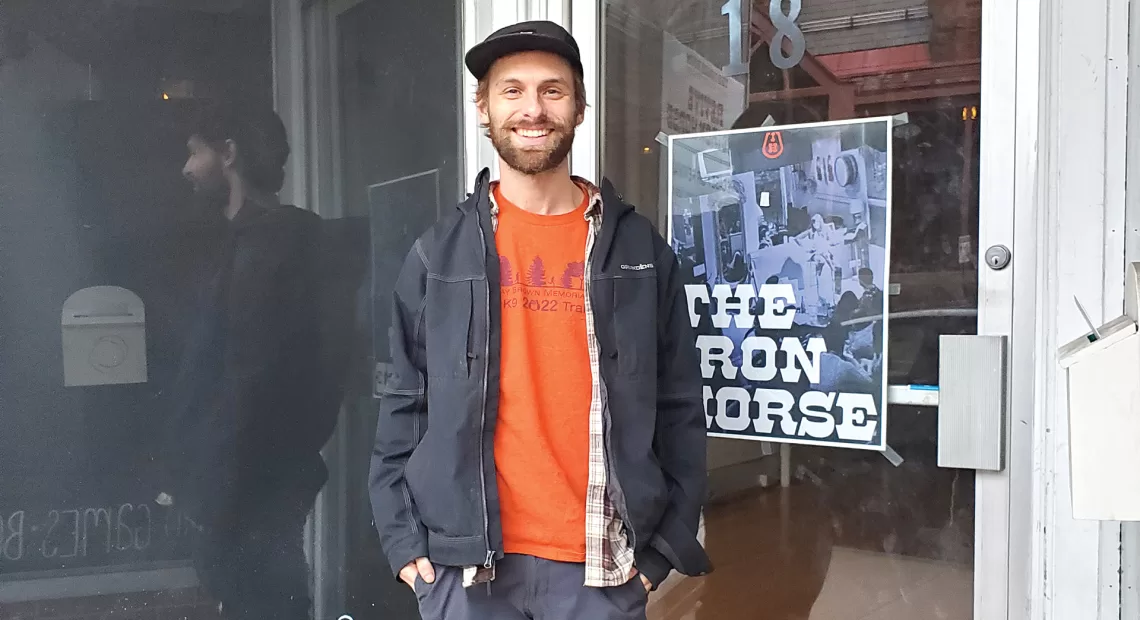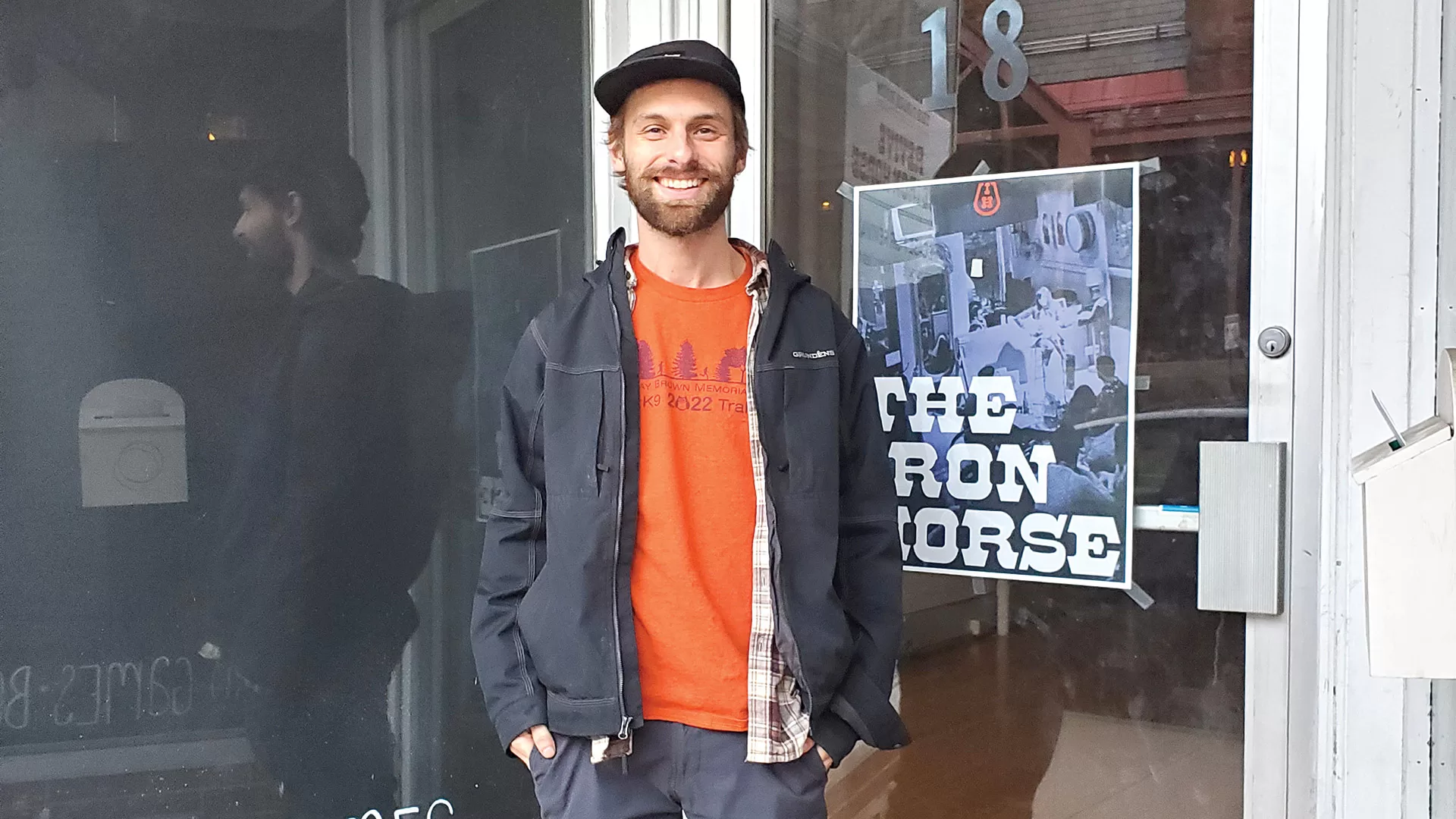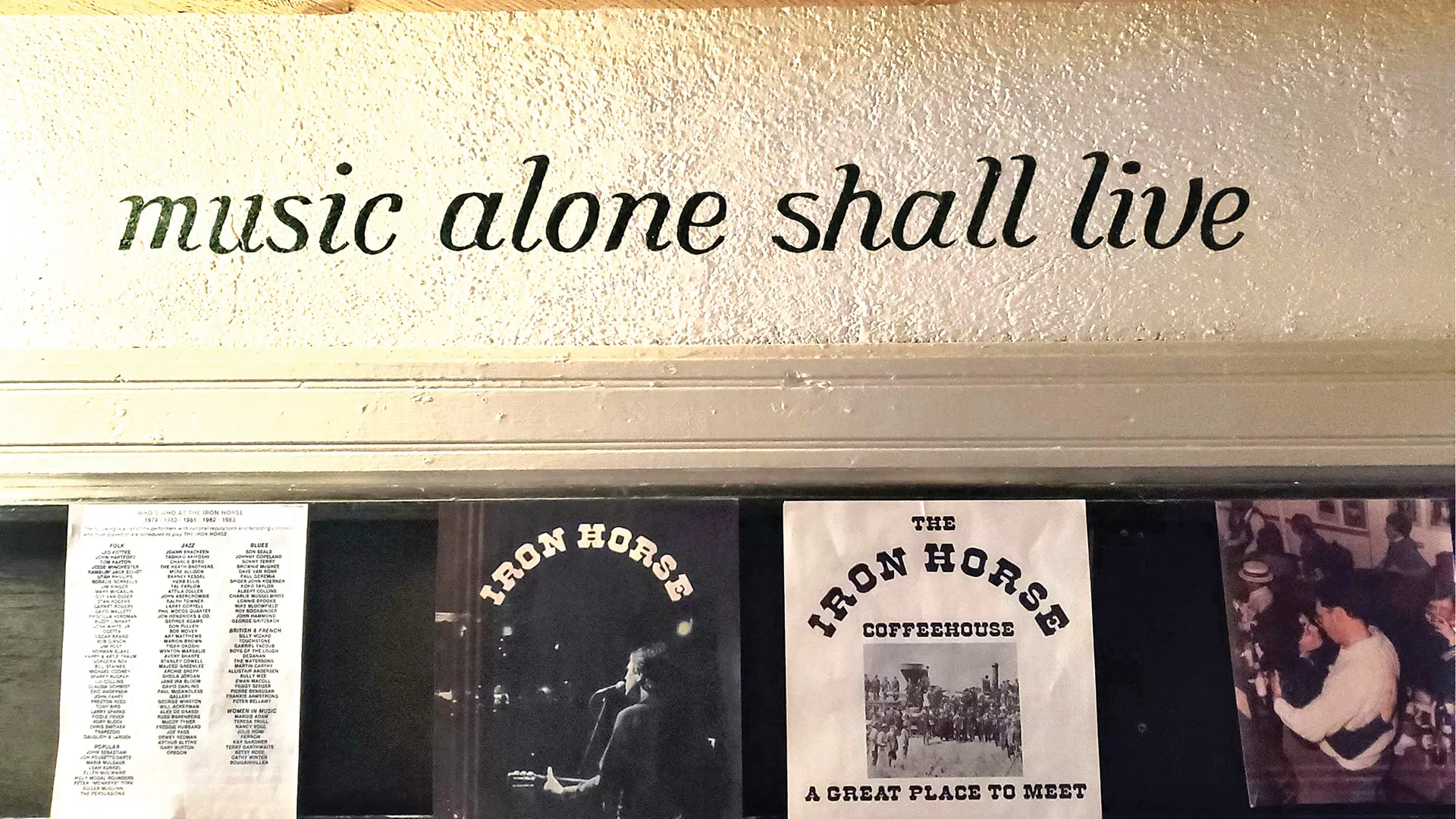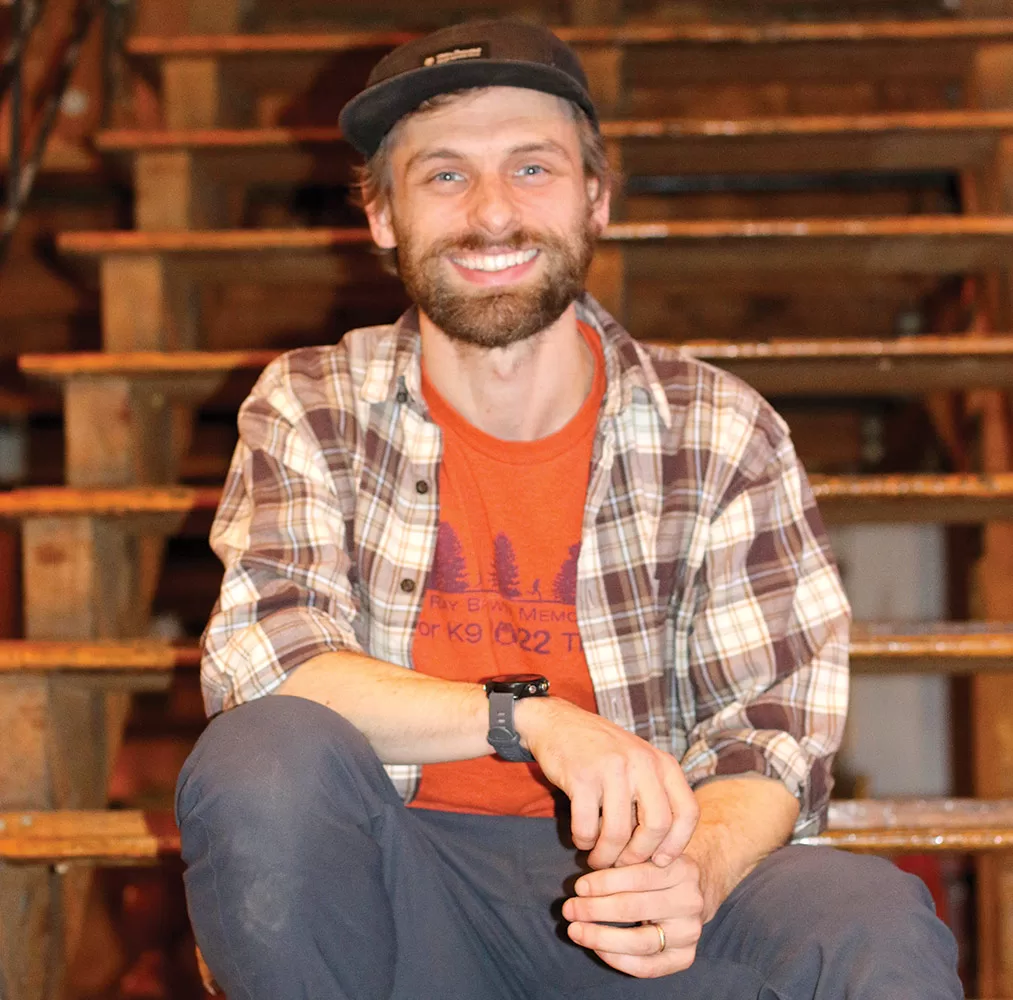
Inside the Campaign to Reopen the Iron Horse This Spring
Music Will Live Again
By Emily Thurlow

Chris Freeman, executive director of the Parlor Room Collective
Photo by Emily Thurlow
There’s a lot to love about the Iron Horse Music Hall.
Though it’s not as apparent from the outside, with its large storefront windows covered in layers of tape holding up posters advertising myriad performers and upcoming shows, the downtown space holds countless special memories for lovers of live music in Western Mass., as reflected in its venerable slogan, “music alone shall live.”
Over the course of its more than four decades in existence, thousands of musical acts have graced the stage at the historic Northampton venue — one of a handful of hotspots, in fact, that helped define the city as an entertainment destination.
Whether leaning on the balcony railing or sitting at a table, or swaying from side to side at the edge of the stage, audiences of multiple generations have been entertained time and time again by artists like jazz musicians Freddie Hubbard and Bobby McFerrin, singer-songwriters from Brandi Carlile to Robyn Hitchcock, rockers like Graham Parker and the Smashing Pumpkins, and contemporary folk icons like Dar Williams and Dan Bern.
And while concertgoers and performers alike cherished the intimate atmosphere within the historic walls, it’s no secret that the Iron Horse also carries a less-pleasant legacy with regard to uncomfortable room temperatures, underwhelming bathrooms, and a poorly maintained green room — not to mention labor complaints and an extended closure that marred the last few years of the venue’s previous ownership by Eric Suher.
The the new owner, however — a nonprofit called the Parlor Room Collective that operates other small, local performance spaces — has plans to make those less-appealing accounts a thing of the past and reopen the Iron Horse this May.
“This is a living place. You can have people seated around the outside on the balcony or standing, and you could have college kids moshing and dancing in the pit while you have all of their parents eating a nice meal around the outside. Everyone feels safe.”
Nearly halfway to the $750,000 goal of a capital campaign launched in November, the Valley-based nonprofit continues to call on the public to invest in the Iron Horse Music Hall. The Parlor Room Collective will use that investment to expand and renovate the facility’s footprint to enhance the overall experience for patrons and improve the space for artists, which will, in turn, bring people together through music as it did not so long ago, said Chris Freeman, executive director of the Parlor Room Collective.
“Our mission at the Parlor Room Collective is to enhance the health and vitality of our community through the power of music. We have witnessed the magic of our local music scene and its ability to fuel the engine of our economy, enhance the overall well-being of our community, and contribute to our cultural vitality,” Freeman said. “And now we stand at a pivotal moment in our journey as a nonprofit arts organization. We have a unique opportunity to revive a local treasure that has resonated with music lovers for generations: the Iron Horse.”
The Good, the Bad, and the Disgusting
Many who have entered the music industry at a grassroots level have performed at one point or another at the Iron Horse, Freeman said.
Take singer-songwriter Tracy Chapman, for example. Prior to taking home numerous Grammy awards for her eponymous 1988 debut, Chapman played at the Northampton venue, long before it was the multi-level experience it is today, Freeman noted.

“From John Mayer and Wynton Marsalis to Allen Ginsberg and Beck … the amount of performers that have played here goes on forever, and in every genre,” he said.
Before earning that reputation, the 20 Center St. mainstay was known as the Iron Horse Coffeehouse. At the time of its opening in 1979, the club’s capacity was limited to 60 people. Co-founded by Jordi Herold and John Riley, the venue was named for a work of sculpture that Herold’s mother had created.
About a decade — and a few expansions — later, the club could accommodate 170 seats and had became known as the Iron Horse Music Hall. Suher, a notable Northampton developer, purchased the venue in 1995 and owned it until its sale to the Parlor Room Collective in 2023.
Though he’s spent considerable time in the space, Freeman still marvels at how the unique venue lends itself to an eclectic, multi-generational experience. “This is a living place. You can have people seated around the outside on the balcony or standing, and you could have college kids moshing and dancing in the pit while you have all of their parents eating a nice meal around the outside. Everyone feels safe.”
At the same time, the venue has presented some unpleasantness for its guests. In recent years, some artists have publicly addressed such issues. Freeman recalled attending a show for Vanessa Carlton, who talked about how cold she was during her 2017 performance at the venue.
Carlton, best known for her 2002 hit single, “A Thousand Miles,” publicly thanked an audience member who loaned her fingerless gloves via a post on Twitter, stating, “it was freezing on stage” and Suher’s Iron Horse Entertainment Group “wouldn’t turn the heat up.”
In response, Suher denied Carlton’s assertions and told the Daily Hampshire Gazette at the time that “the performer was cold on the stage. The venue temp was 70 degrees.”
Carlton further spoke of the disarray in the green room, which was also located in the basement. On Twitter, she posted a photo of furniture with ripped and torn fabric and cushions collapsing and urged owners to toss it, so that she would return to the venue again in the future.
Though the space allowed fans to get close to artists, the space wasn’t especially welcoming, Freeman noted, adding the green room was known in the area for its poor condition, and the basement was the only place on site equipped with bathrooms. “These two disgusting bathrooms are supposed to serve 250 people — including the artists. They’re so, so gross.”
“Understanding its history, I kept thinking about how it’s just such an important place for our whole community, and I thought that somebody has to reopen this place.”
As for the HVAC unit, Freeman said the Iron Horse is in need of a serious upgrade. He explained the challenges of trying to keep a packed house well-regulated, whether the meant warm enough or cool enough. “There are tons of famous artist complaints of playing in here with it being 90 degrees — and 20 degrees outside.”
Music and Memories
Freeman’s knowledge of the Iron Horse goes well beyond his time as a board member for the Parlor Room. Growing up in Farmington, Conn., he would often attend shows at the Iron Horse with his father. The Valley’s music scene was especially attractive to him and made him want to move to the area, he said.
“Northampton was kind of like a grungy, artsy, cool place where people knew about artists. People had an understanding of bands that ran a little bit deeper than whoever’s on the big country radio station or the big pop stuff,” he said. “I remember the first time I came here. I knew I wanted to be a musician, and I thought that if I could just open a show at the Iron Horse, I’ll have made it.”
By his 10th or 11th visit to the Iron Horse, Freeman did just that and performed with the Americana/folk-rock group he helped found, Parsonsfield.
His band, which was signed to the Signature Sounds record label, was among the first artists to perform at the Parlor Room, located at 32 Masonic St. — just a block away from the Iron Horse. The Parlor Room was founded by Signature Sounds Recordings in the fall of 2012 as an “artist-and-audience-friendly” listening room, performance space, and school of music, he explained.

Chris Freeman sits on the Iron Horse’s prominent stairs to the second level, where the new restrooms will be located.
Freeman spent roughly a decade touring with Parsonsfield at venues throughout the U.S. In February 2022, he transitioned into the role of executive director of the Parlor Room and played a critical role in helping the organization transition into a nonprofit music venue and school last January.
On a near-daily basis, Freeman, who is now a resident of Northampton, would find himself walking by the Iron Horse, seeing the legendary venue remain dark.
“Understanding its history, I kept thinking about how it’s just such an important place for our whole community, and I thought that somebody has to reopen this place,” he told BusinessWest. “This was a place that is the heart of the whole Western Mass. music scene. The culture and the city around it made me want to move here.”
Freeman’s understanding of the value of the property led him to reach out to Suher. This past September, the Parlor Room announced it had reached an agreement with Suher to purchase the business, which includes the venue’s liquor license.
The Parlor Room signed a 15-year lease to not only operate the business at its current space at 18 and 20 Center St., but also to expand into 22 Center St. Connecting the adjacent storefronts will allow the Iron Horse to have a dedicated bar and community space and will increase the venue’s overall square footage by 40%, he explained.
Once renovations are completed and the Iron Horse has reopened, the Parlor Room will be, as its name suggests, a collective that encompasses three projects: the Iron Horse, the Parlor Room, and the Parlor Room School of Music. The original Parlor Room venue on Masonic Street will live on as the headquarters for the School of Music and an intimate performance venue.
“My main goal is, I wanted this place to come back, and I wanted to live in a city that has music — that’s why I moved here in the first place. My secondary goal is to make the Parlor Room become just as big of a part of this community,” Freeman said. “The ability to merge these together and to make sure that this place comes back — in the right way and with the right mission and in line with the community’s goals — felt like a really important thing to do.”
What’s the Plan?
With the aim of reopening this spring, the Parlor Room has set an ambitious renovation timeline that’s already underway, while the capital campaign continues. To date, the campaign has surpassed $317,500.
Among the biggest costs will be an upgraded sprinkler system and HVAC unit, Freeman said. The first phase of renovations also encompass updates to flooring, a new sound and lighting system, and stage and bar enhancement funded in part by a $73,000 American Rescue Plan Act grant from the city of Northampton.
The nonprofit has also partnered with Dave Schrier, co-owner of Easthampton’s Daily Operation, to redesign the dining and bar experience at the Iron Horse.
Phase two of the renovations will focus on accessibility and other upgrades. Instead of the two basement bathrooms, the new space will include 10 bathrooms that will be relocated for increased accessibility. This also includes two bathrooms accessible for those who use wheelchairs, in compliance with the federal Americans with Disabilities Act. A wheelchair lift will also be installed to make the stage accessible for all.
The Parlor Room Collective will also establish a brand-new green room that includes private bathrooms with a shower. A new floor layout will allow for 300 people for standing-room-only events and variations of more than 200 people seated in new furniture.
“There is no better investment in our community — and what, historically, has seen Northampton as a community thrive, business-wise — than bringing back the Iron Horse and having this place open 250 nights a year with a bar, with the way that it impacts other restaurants and tourism in the area,” Freeman said.
To donate to the “Revive the Iron Horse” capital campaign, visit ironhorse.org.





